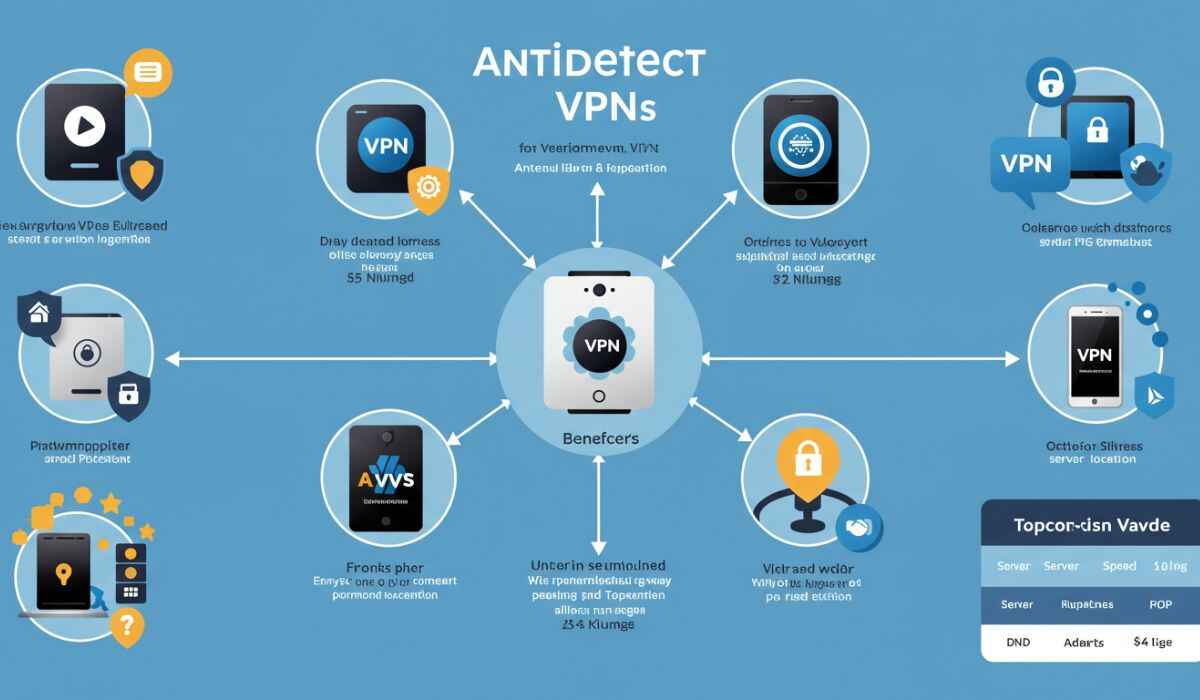When you run multiple accounts or manage sensitive campaigns, combining the Multilogin Tool with a reliable anti-detect vpn helps maintain distinct digital identities. These services work alongside browser profiles to mask network details and prevent trackers from linking sessions. Below, you’ll find ten top contenders that work smoothly with Multilogin, along with insights into how they compare to other private browsing tools and traditional proxies.
Selection Criteria
To choose the best providers, we focused on network stability, geographic coverage, privacy policies, and ease of setup with Multilogin. Each entrant offers features to hide browser fingerprint, support for major platforms, and compatibility with WebRTC and DNS leak protections. We also considered whether they function purely as an anti-fingerprint VPN or add other layers, such as dedicated servers or mobile IP pools.
1. NordVPN
Known for broad server availability, NordVPN supports obfuscated servers that mask VPN use altogether. Its strict no-logs policy and built-in ad blocker make it more than a simple anti-detect vpn. Setup with Multilogin is straightforward: import the OpenVPN or WireGuard configuration, enable kill switch, and your browser profiles will run without revealing real IPs.
2. Surfshark
Surfshark offers a MultiHop feature that routes traffic through two servers, reinforcing the idea of hiding the browser fingerprint. Unlimited simultaneous connections mean you can secure every device running Multilogin. Its affordable pricing and easy-to-use desktop client simplify profile setup, while TruePlay servers help evade ISP or network-level blocks.
3. ProtonVPN
Backed by a robust privacy ethos, Proton VPN provides Secure Core servers that channel data through Swiss and Icelandic nodes. These extra hops form part of its anti-fingerprint VPN approach. When paired with Multilogin Tool, Proton VPN’s DNS leak protection and permanent kill switch ensure each browser instance stays compartmentalized.
4. ExpressVPN
ExpressVPN relies on RAM-only servers to avoid storing logs, and its proprietary Lightway protocol delivers fast connections ideal for automation. Although pricier, it excels at private browsing tools integration, thanks to clear setup guides for Multilogin’s proxy manager. It’s reliable split tunneling also lets you route only Multilogin traffic through the VPN.
5. Ivacy VPN
Ivacy stands out with dedicated IP options and over 3,500 servers, enhancing session separation. Its StealthVPN mode hides the fact you’re using a VPN, crucial when you need to bypass strict geo-locks. Combining Ivacy’s dedicated IP with Multilogin profiles cuts down cross-session leaks.
6. Windscribe
Windscribe makes a case as a budget-friendly anti-detect vpn by offering both paid and generous free plans. Custom R.O.B.E.R.T. filtering lets you block ads and trackers at the network level. Simply configure the SOCKS5 proxy endpoint in Multilogin, and you achieve basic fingerprint cloaking without a full client install.
7. TorGuard
Designed with power users in mind, TorGuard offers customizable port selection and stealth options that obfuscate VPN traffic. Its vast selection of dedicated IPs caters to high-volume account management. Integrating TorGuard’s OpenVPN profiles into Multilogin keeps each browser profile under strict network isolation.
8. Hide.me
Hide.me delivers a straightforward desktop app and supports IKEv2, OpenVPN, and WireGuard. Its no-logs commitment and transparent audits make it a reliable anti-fingerprint VPN. Multilogin users benefit from the provider’s quick-connect feature, which lets you assign server regions per browser profile in seconds.
9. PrivateVPN
PrivateVPN earns praise for minimal connection overhead and reliable speeds, especially across European servers. Though it covers fewer locations than some peers, its stealth mode and port forwarding options reinforce cross-profile separation. For those comparing vpn vs anti-detect browser, it bridges the gap by offering both VPN tunneling and SOCKS5 proxy endpoints.
10. Smartproxy
While primarily a proxy service, Smartproxy also offers SOCKS5 and HTTPS connections that function like a lightweight VPN. Its rotating residential IP pools excel at truly disguising endpoints, rivaling many proxy vs anti-detect browser setups. Integrate Smartproxy directly in Multilogin’s proxy settings to balance speed and anonymity.
Comparing VPNs, Proxies, and Dedicated Browsers
Traditional VPNs secure an entire device, whereas anti-detect browsers isolate each profile’s session data. Proxies handle one application at a time but may leak WebRTC or DNS data if misconfigured. Many of the tools above blend approaches, offering both VPN tunnels and proxy endpoints, to give you flexibility on how to hide browser fingerprints within Multilogin.
Conclusion
Choosing the right anti-detect vpn depends on your scale, budget, and regional needs. For global reach, NordVPN and ExpressVPN shine, while niche services such as Smartproxy excel in rotating residential IPs. Pairing your Multilogin profiles with a custom VPN or proxy endpoint sufficiently separates projects and helps to avoid sophisticated tracking techniques.
